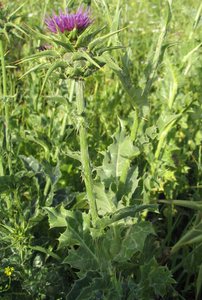
Chinese Pinyin: Shui Fei Ji Latin: Silybum Marianum
Part of Herb Used: Seed
Family:
Traditional Chinese Medicinal (TCM) Uses:*
In herbalism, it is used in cases of liver diseases (cirrhosis, jaundice and hepatitis), gallbladder disease,[citation needed] and is claimed to protect the liver against poisons. Silibinin (syn. silybin, sylimarin I) is a hepatoprotective (antihepatotoxic), antioxidant (radical-scavenging agent), thus stabilizing and protecting the membrane lipids of the hepatocytes (liver cells). Silicristin inhibits the enzymes peroxidase and lipoxygenase. Silidianin is a plant growth regulator. A 2000 study of such claims by the AHRQ concluded that "clinical efficacy of milk thistle is not clearly established".
For many centuries extracts of milk thistle have been recognized as "liver tonics."[3] Research into the biological activity of silymarin and its possible medical uses has been conducted in many countries since the 1970s, but the quality of the research has been uneven.[8] Milk thistle has been reported to have protective effects on the liver and to greatly improve its function. It is typically used to treat liver cirrhosis, chronic hepatitis (liver inflammation), toxin-induced liver damage including the prevention of severe liver damage from Amanita phalloides ('death cap' mushroom poisoning), and gallbladder disorders.[2][9]1.*
References:
- Source: http://en.wikipedia.org/wiki/Milk_thistle, http://en.wikipedia.org/wiki/Silybum_marianum#Herbal_medicinal_research, http://alternativehealing.org/shui_fei_ji.htm
Natural dietary supplements are designed to offer the body support to promote health, harmony, balance and overall well being.*

 Get Well Natural, LLC
Get Well Natural, LLC  Kidney Function & Regeneration Health
Kidney Function & Regeneration Health  Platelet & Blood Cell Health
Platelet & Blood Cell Health  Prostate, Flow & Function Health
Prostate, Flow & Function Health  General Mind & Body Health
General Mind & Body Health  Heart, Cholesterol & Cardio Health
Heart, Cholesterol & Cardio Health  Allergy-Free Body
Allergy-Free Body  Anxiety & Stress
Anxiety & Stress  Blood Platelet Counts & Function
Blood Platelet Counts & Function  Blood Pressure Health
Blood Pressure Health  Kidney Health
Kidney Health  Immune System Health & Balance
Immune System Health & Balance  Prostate & Urinary Health Function
Prostate & Urinary Health Function  Blood Sugar Balance
Blood Sugar Balance  Cardiovascular Heart Health
Cardiovascular Heart Health  Detoxification & Healthy Cells
Detoxification & Healthy Cells  Women's Health
Women's Health  Liver Regeneration
Liver Regeneration  Pain-Free Body
Pain-Free Body  Water & Air Filtration
Water & Air Filtration 


